In the fast-paced digital world, content marketing has emerged as a powerful tool to engage and attract audiences. As a content marketing strategist, I have witnessed firsthand the impact it can have on businesses across the globe. In this article, we will explore the dynamic landscape of content marketing, uncover valuable insights, and provide actionable tips to help you navigate the content marketing world successfully.
Table of Contents
Understanding the Content Marketing World

The content marketing world is a dynamic and ever-evolving landscape where businesses strive to engage, inform, and connect with their target audience through strategic content initiatives. In this digital era, content marketing has become a cornerstone of successful marketing strategies. It encompasses various techniques and approaches, including guest post services and blogger outreach services, to expand brand reach and establish industry authority.
Guest post services play a significant role in the content marketing world. They offer opportunities for content creators to contribute their expertise to other blogs or websites within their niche. By collaborating with relevant platforms, businesses can leverage guest post services to showcase their knowledge, increase brand visibility, and drive referral traffic to their own website. Guest posting enables content marketing strategists to establish themselves as an industry thought leaders and build credibility within their target audience.
Another important aspect of the content marketing world is blogger outreach services. Engaging with influential bloggers within the target industry or niche can significantly amplify brand visibility and connect with a wider audience. Blogger outreach services involve building relationships with these bloggers and collaborating with them to promote content or products. By leveraging the existing audience of influential bloggers, businesses can tap into their credibility and trust, ultimately expanding their reach and gaining valuable exposure.
Leveraging Guest Post Services and Blogger Outreach for Effective Content Marketing
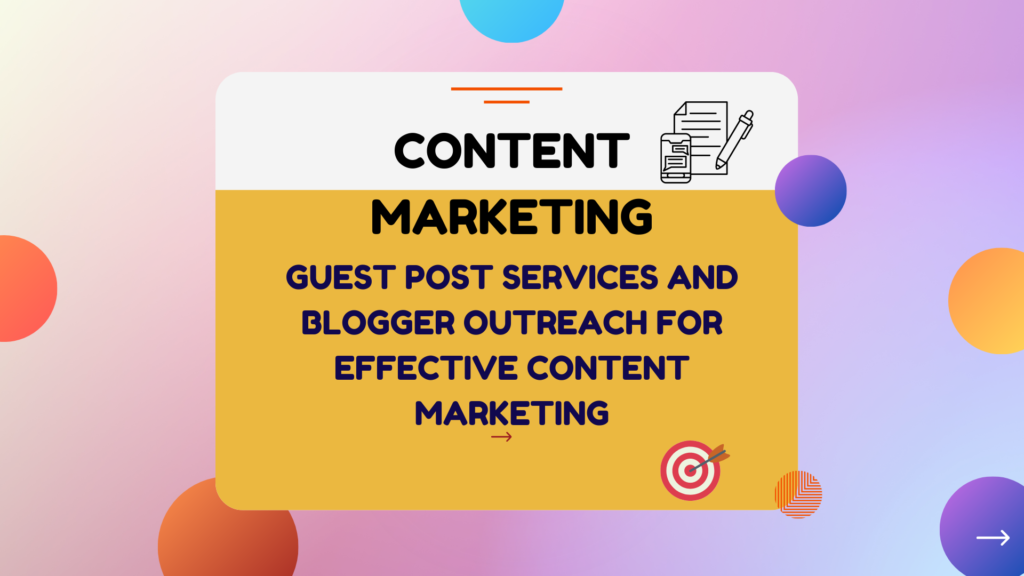
Content marketing thrives on collaboration and reaching new audiences. One effective strategy to expand your content’s reach is by leveraging guest post services and blogger outreach. By tapping into the network of influential bloggers and websites, you can amplify your brand’s visibility and connect with a broader audience. In this section, we will explore the power of a guest post service and blogger outreach in content marketing and how to make the most of these opportunities.
The Role of a Content Marketing Strategist
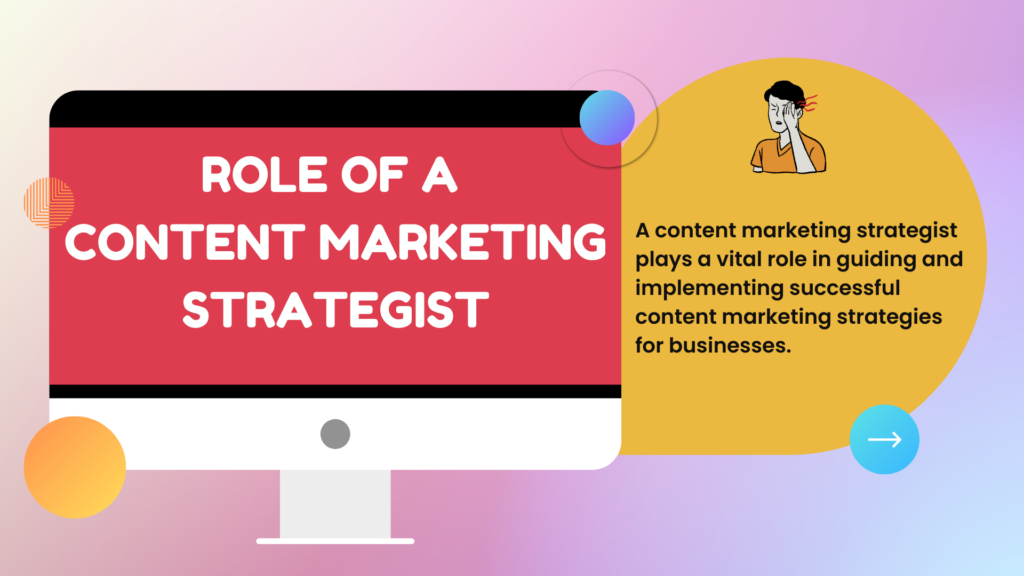
A content marketing strategist plays a vital role in guiding and implementing successful content marketing strategies for businesses. With their expertise, they shape the direction and execution of content initiatives to achieve specific goals. Here’s an overview of the key responsibilities and contributions of a content marketing strategist:
- Strategic Planning: A content marketing strategist conducts thorough research to understand the target audience, market trends, and competitor landscape. They develop a comprehensive content strategy aligned with the brand’s objectives, ensuring that it resonates with the intended audience and supports business growth.
- Audience Analysis: Understanding the target audience is crucial for effective content marketing. A content marketing strategist identifies the audience’s demographics, preferences, and pain points to create highly relevant and engaging content that meets their needs. This ensures that the content connects with the right people and delivers value.
- Content Creation and Optimization: The content marketing strategist collaborates with content creators, writers, and designers to develop compelling and informative content. They provide guidance on optimizing content for search engines, incorporating relevant keywords, and enhancing readability to improve visibility and attract organic traffic.
- Distribution and Promotion: Effective content marketing involves strategically distributing and promoting content to reach the intended audience. The strategist identifies the most appropriate channels, such as social media platforms, email marketing, or industry publications, to maximize content exposure and engagement.
- Performance Analysis: A content marketing strategist monitors the performance of content campaigns using analytics tools. They track key metrics like website traffic, engagement rates, conversions, and audience feedback. This data-driven approach enables them to measure the effectiveness of content initiatives, identify areas for improvement, and make data-backed decisions.
- Collaboration and Coordination: Content marketing strategists work closely with cross-functional teams, including writers, designers, SEO specialists, and social media managers. They ensure alignment and collaboration to deliver cohesive and impactful content campaigns that drive results.
- Industry Trends and Best Practices: Staying updated with the latest industry trends, emerging technologies, and best practices is essential for a content marketing strategist. They continuously research and analyze the evolving landscape to incorporate innovative strategies and techniques into their content plans.
By fulfilling these responsibilities, a skilled content marketing strategist helps businesses create and implement effective content marketing strategies. They play a crucial role in driving brand awareness, increasing website traffic, engaging the target audience, and ultimately achieving business objectives through impactful content initiatives.
Exploring Different Types of Content Marketing Strategies
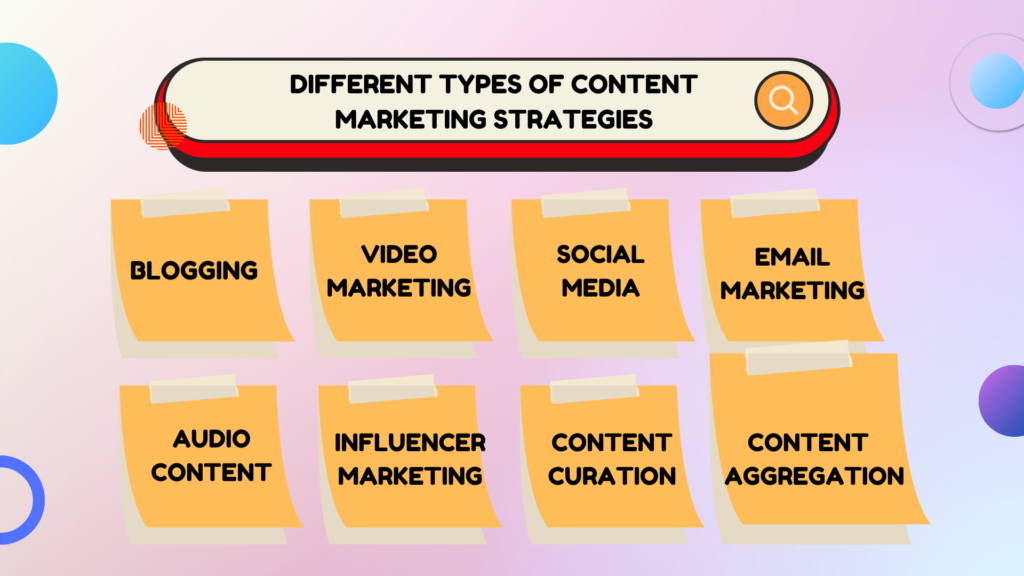
Content marketing encompasses various strategies and approaches that help businesses connect with their target audience and achieve their marketing goals. By understanding the different types of content marketing, you can choose the most suitable strategies for your brand. In this section, we will explore and discuss some popular types of content marketing and how they can be effectively utilized.
Blogging as a Content Marketing Strategy
Blogging is one of the most common and effective content marketing strategies. It involves creating and publishing informative and engaging blog posts on a regular basis. Blogging allows businesses to showcase their expertise, provide valuable insights to their audience, and drive traffic to their website. It also serves as a platform for sharing industry news, trends, and thought leadership content.
Video Marketing for Engaging Visual Content
Video marketing has gained immense popularity in recent years. It involves creating and sharing videos that educate, entertain, or inspire the audience. Videos can be in the form of tutorials, product demonstrations, interviews, or storytelling content. With the rise of platforms like YouTube and social media video features, video marketing provides an engaging and memorable way to connect with your audience.
Social Media Content Strategies
Social media platforms offer a powerful channel for content marketing. Businesses can create and share various types of content, including images, videos, infographics, and written posts, to engage their audience and build brand awareness. Social media content strategies involve understanding the target audience, selecting the appropriate platforms, and creating shareable and interactive content to drive engagement and social sharing.
Email Marketing and Newsletter Campaigns
Email marketing remains an effective content marketing strategy for nurturing leads and building customer relationships. By creating informative newsletters and targeted email campaigns, businesses can deliver valuable content directly to their subscribers’ inboxes. Email marketing helps businesses stay top-of-mind with their audience, promote new products or services, and drive traffic to their website or blog.
Interactive Content for Enhanced Engagement
Interactive content refers to content that requires active participation from the audience, such as quizzes, assessments, polls, and interactive infographics. This type of content encourages engagement, provides personalized experiences, and can be highly shareable. Interactive content marketing strategies help businesses capture and maintain the attention of their audience while delivering valuable information.
Podcasting for Audio Content
Podcasting has experienced significant growth and offers a unique way to deliver content to a highly engaged audience. Businesses can create podcasts to share industry insights, interview experts, or discuss relevant topics. Podcasting allows for convenient consumption of content, catering to individuals who prefer audio formats.
Leveraging Influencer Marketing
Influencer marketing involves collaborating with influential individuals within your industry or niche to promote your brand or products. Influencers have a dedicated following and can help businesses reach a wider audience. This type of content marketing leverages the trust and credibility that influencers have built with their audience, leading to increased brand awareness and potential conversions.
Content Curation and Aggregation
Content curation involves gathering and sharing relevant content from various sources with your audience. It allows businesses to position themselves as trusted resource and provide valuable information without creating original content. Content aggregation platforms can help streamline the process of finding and curating content from different channels.
By understanding the different types of content marketing strategies, businesses can tailor their approach to resonate with their target audience. Incorporating a mix of strategies, such as blogging, video marketing, social media content, email marketing, interactive content, podcasting, influencer marketing, and content curation, can enhance brand visibility, engagement, and customer loyalty. Experimenting with different types of content marketing and analyzing the results will help businesses refine their strategies and achieve their marketing objectives.
Key Tips for Effective Content Marketing

Define Your Objectives
Before embarking on any content marketing endeavor, clearly define your goals. Whether it’s driving brand awareness, generating leads, or nurturing customer loyalty, aligning your content with specific objectives is essential.
Understand Your Audience
Deeply understand your target audience by conducting thorough market research. Identify their pain points, preferences, and interests to tailor your content accordingly.
Develop a Content Strategy
A comprehensive content strategy is the backbone of successful content marketing. It outlines the types of content to create, platforms to leverage, and the frequency of publishing.
Create Valuable and Engaging Content
Quality content is king. Craft informative, entertaining, and relevant content that resonates with your audience, provides value, and encourages engagement.
Leverage SEO Techniques
Optimize your content for search engines by incorporating relevant keywords naturally. This will enhance your visibility and improve your organic search rankings.
Embrace Visual Content
Visuals, such as images and videos, have a profound impact on audience engagement. Incorporate visually appealing elements to enhance the effectiveness of your content.
Leverage Social Media
Social media platforms are invaluable for content distribution and building a community around your brand. Share your content across relevant channels and encourage user interaction.
Analyze and Iterate
Regularly analyze your content marketing efforts to identify what works and what doesn’t. Use data-driven insights to refine your strategy and make informed decisions.
FAQs about Content Marketing
Q1: What is the best way to measure content marketing success?
A: Content marketing success can be measured using various metrics, including website traffic, conversions, social media engagement, and brand sentiment analysis.
Q2: How long does it take to see results from content marketing efforts?
A: Content marketing is a long-term strategy, and results may vary depending on factors such as industry, competition, and target audience. It may take several months to see significant results, so patience and consistency are key.
Q3: What are some content marketing trends to watch out for?
A: Some emerging content marketing trends include interactive content, personalized marketing experiences, voice search optimization, and leveraging artificial intelligence in content creation.
Q4: Is it necessary to hire a content marketing strategist?
A: While it’s not mandatory, hiring a content marketing strategist can greatly benefit your content marketing efforts. A strategist brings expertise and experience to the table, helping to create a comprehensive and effective content strategy. They also ensure that your content aligns with your brand’s goals and resonates with your target audience. Ultimately, a content marketing strategist can save you time, effort, and resources, while delivering tangible results.
The Evolving Landscape of Content Marketing
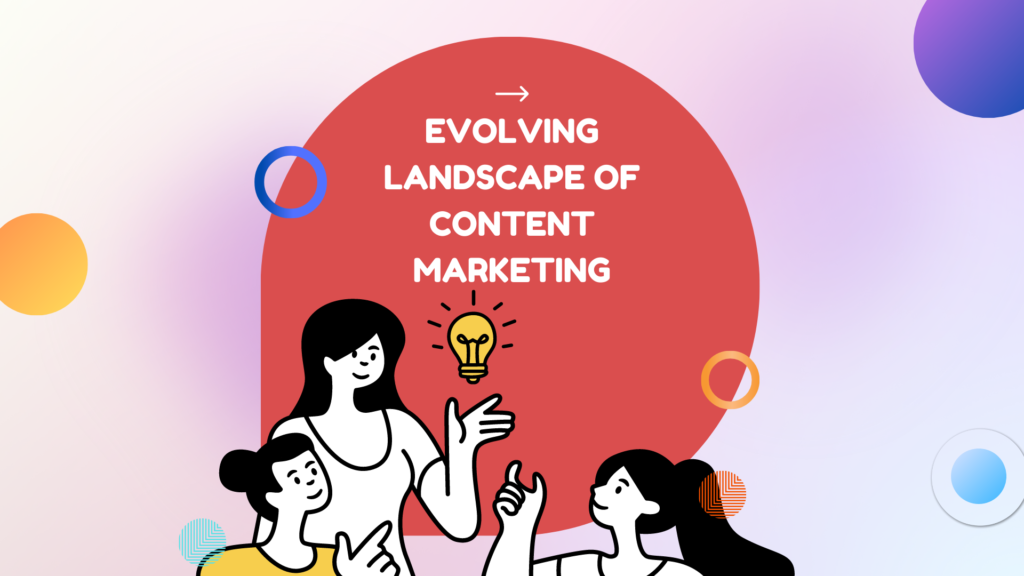
Content marketing is a dynamic field that constantly evolves to adapt to changing consumer behaviors and technological advancements. As a content marketing strategist, it is crucial to stay informed about the latest trends and industry developments. Here are some key insights into the evolving landscape of content marketing:
Rise of User-Generated Content
User-generated content (UGC) has gained significant traction in recent years. Consumers now actively contribute to brand narratives through reviews, testimonials, social media posts, and videos. As a content marketing strategist, harnessing the power of UGC can foster authenticity, build trust, and amplify brand reach.
Mobile Optimization and Voice Search
With the increasing use of smartphones and smart devices, optimizing content for mobile platforms has become imperative. Additionally, the rise of voice search technology has transformed the way people search for information. Incorporating voice search optimization techniques, such as using natural language and long-tail keywords, can enhance visibility in search engine results.
Personalization and Customization
Consumers now expect personalized experiences from brands. Tailoring content to individual preferences and needs can significantly improve engagement and conversions. Content marketing strategists should leverage data analytics and automation tools to deliver personalized content at scale.
Video Dominance
Video content continues to dominate the content marketing landscape. It captures attention, conveys information effectively, and encourages engagement. From short-form videos for social media to longer-form content for websites and YouTube, incorporating video into your content strategy can yield remarkable results.
Integration of AI and Machine Learning
Artificial intelligence (AI) and machine learning (ML) technologies are revolutionizing content marketing. They can automate content creation, personalize recommendations, and analyze data for valuable insights. Content marketing strategists should explore AI-powered tools and platforms to optimize their efforts and streamline processes.
Focus on Long-Term Relationships
Building long-term relationships with customers has become a priority. Content marketing is shifting from short-term campaigns to nurturing customer loyalty through consistent, valuable content. Content marketing strategists must focus on building trust, fostering community, and nurturing customer relationships over time.
Ethical and Authentic Content
Consumers increasingly value transparency, authenticity, and ethical practices from brands. Content marketing strategists should prioritize creating content that reflects the brand’s values, maintains transparency, and promotes social responsibility. This helps build trust and loyalty among consumers.
The Future of Content Marketing
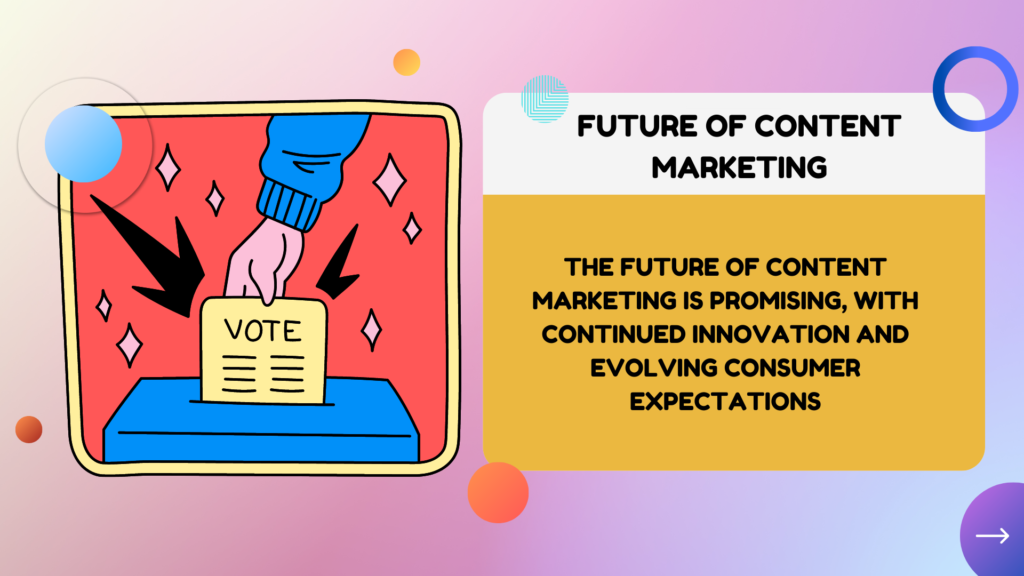
The future of content marketing is promising, with continued innovation and evolving consumer expectations. Content marketing strategists need to anticipate and adapt to these changes to stay ahead of the competition. Here are some key trends that will shape the future of content marketing:
Artificial Intelligence and Automation
AI and automation technologies will play an increasingly significant role in content marketing. From AI-generated content to automated content distribution and personalization, these technologies will streamline processes and improve efficiency.
Interactive and Immersive Content
Interactive and immersive content, such as augmented reality (AR) and virtual reality (VR) experiences, will become more prevalent. These formats provide unique and engaging ways to connect with audiences, creating memorable brand experiences.
Voice-Activated Content
With the rise of smart speakers and voice assistants, optimizing content for voice search will be crucial. Content marketing strategists should focus on creating conversational, voice-friendly content to cater to this growing trend.
Niche and Micro-Influencers
As influencer marketing continues to evolve, brands are shifting their focus from macro-influencers to niche and micro-influencers. These individuals have smaller but highly engaged audiences and can provide more targeted and authentic brand partnerships.
Privacy and Data Protection
Data privacy concerns are at the forefront of consumer minds. Content marketing strategists must prioritize transparency and adhere to strict data protection regulations to build trust and maintain consumer loyalty.
Sustainable and Socially Responsible Content
Consumers increasingly support brands that prioritize sustainability and social responsibility. Content marketing should reflect these values by promoting eco-friendly practices, diversity and inclusion, and ethical business operations.
Conclusion
Content marketing is an ever-evolving discipline that requires continuous learning, adaptation, and innovation. By understanding the role of a content marketing strategist and staying updated on the latest trends, you can create a successful content marketing strategy that resonates with your target audience, drives engagement, and achieves your business objectives. Embrace the power of content marketing, leverage emerging technologies, and deliver valuable, authentic content to thrive in the dynamic content marketing world.
Content marketing is a powerful tool that can drive business success when executed effectively. By understanding the role of a content marketing strategist and staying updated on the latest trends, you can create a well-rounded content strategy that resonates with your target audience. Remember to define your objectives, create valuable and engaging content, leverage SEO techniques, embrace visual content, and regularly analyze and iterate your strategy. By doing so, you can unleash the full potential of content marketing and thrive in the dynamic content marketing world.
Frequently Asked Questions (FAQs)
Q1: How can I measure the success of my content marketing efforts?
A: Success metrics for content marketing can include website traffic, engagement metrics (such as time spent on page and bounce rate), conversions, social media interactions, and brand sentiment analysis.
Q2: How often should I create and publish content?
A: Consistency is key when it comes to content creation and publishing. Determine a realistic schedule based on your resources and audience preferences, and aim to maintain a steady flow of fresh and valuable content.
Q3: What are the best platforms for content distribution?
A: The choice of platforms depends on your target audience and the nature of your content. Social media platforms like Facebook, Instagram, LinkedIn, and YouTube are popular, but consider other channels such as email newsletters, industry publications, and guest blogging to expand your reach.
Q4: How can I repurpose content effectively?
A: Repurposing content involves adapting existing content into different formats or repackaging it for various channels. For example, a blog post can be transformed into a video, infographic, or podcast episode. This maximizes the reach and impact of your content.
Q5: How can I stay updated with the latest content marketing trends?
A: To stay informed, follow industry publications, attend conferences and webinars, participate in online communities, and engage with thought leaders in the content marketing field. Additionally, subscribe to newsletters and podcasts that focus on content marketing to receive regular updates and insights.

